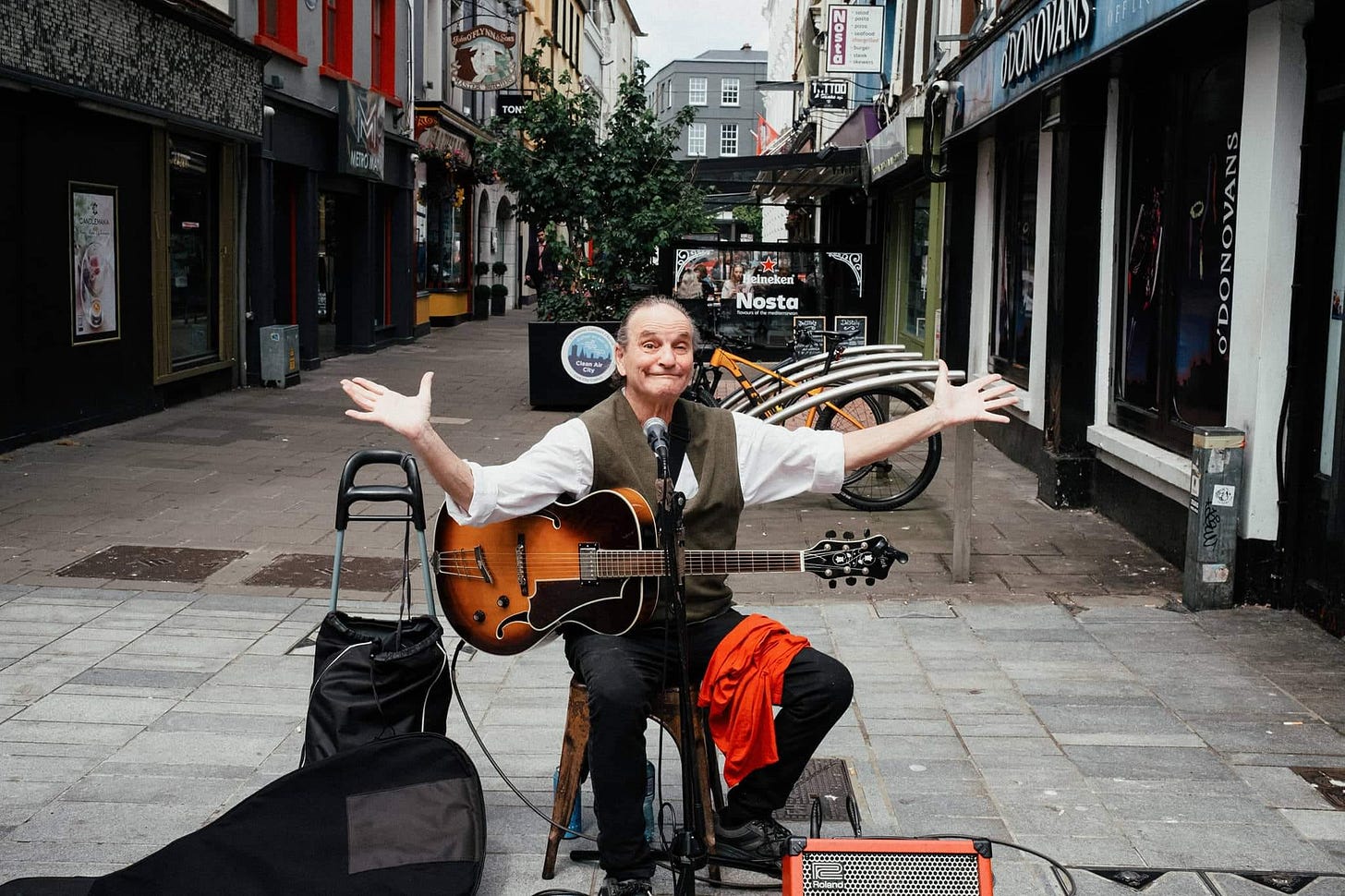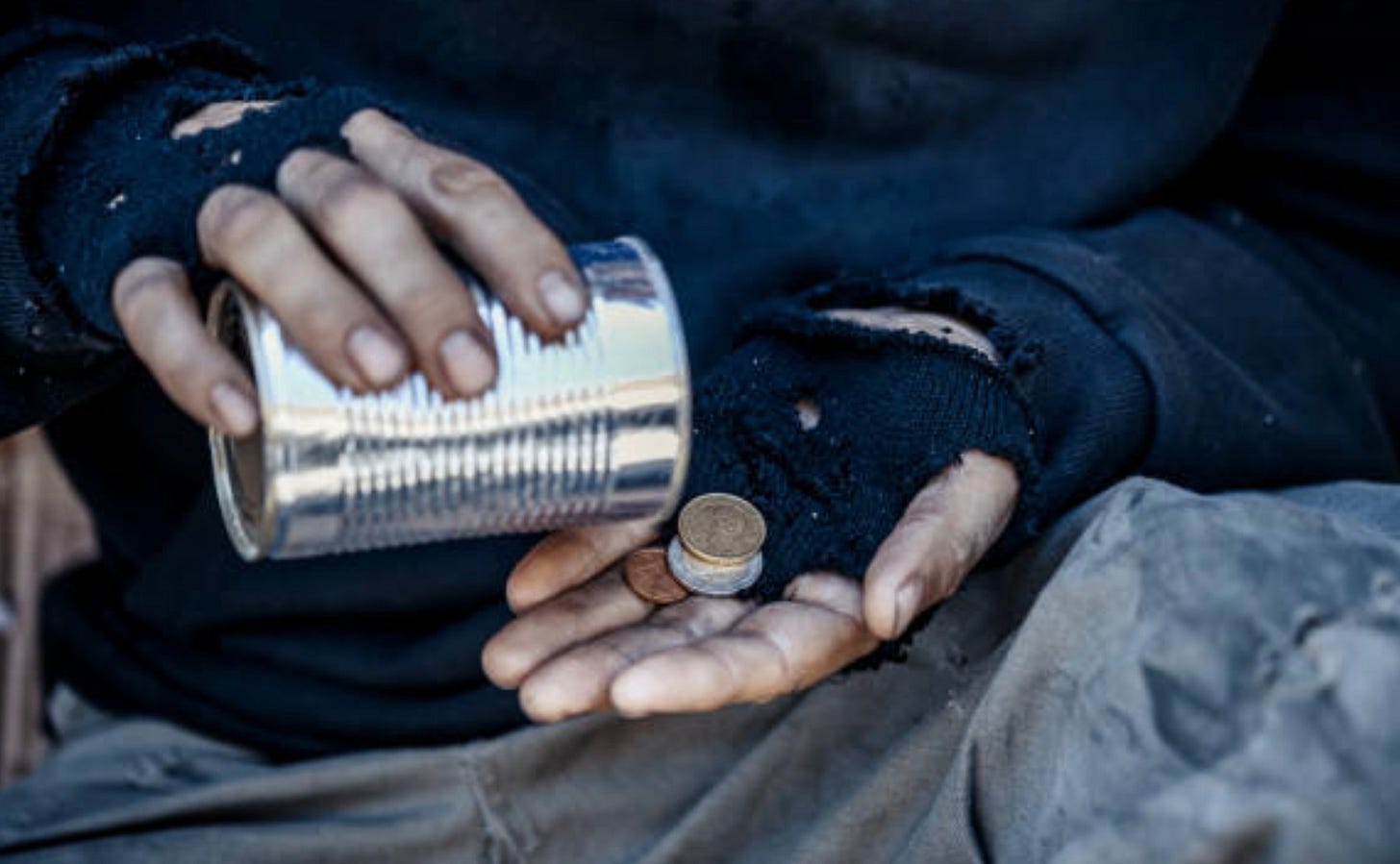A cashless Christmas in Cork?
For charities, service industry workers, buskers and others who rely on the jingle of coins over the Christmas period, what impact will our love affair with cashless transactions have this month?
Picture this: it’s a wet winter morning and you are on your annual Christmas shopping trip.
You’ve gone from Smyths to H&M to Boots in record time, eager to get out of the rain. You can already smell the mince pies you’re going to devour later. You hurry down Paul St. towards your last stop, Waterstones.
The barely audible sound of a tin whistle drifts down the street. The lively, nimble, melodious tune brings you out of your stupor.
John Collins, 72, is always open for a chat. “This is a wonderful way to meet people,” he says. He adores busking, and has no idea what he would do without it. He tells Tripe + Drisheen how he went out every day over the summer to socialise and play his tin whistle and accordion.
On the monetary side of things, however, the incentive just isn’t there. “You cannot make a wage out of it,” he says. “It’s impossible. You cover your expenses and maybe a little more.”
John has no trust in online banking: “If there’s a war or anything like that, if there’s a blackout and you can’t power your system, you’d be in trouble. Keep the cash. You’ve got to have a plan B.”
You have to wonder whether our obsession with paying by card is slowly burning a hole in buskers´ pockets.
Yossi Valdman, another local busker, says “it’s a bit of hard work now to sustain a fair living when people are paying for all their goods in card.”
Yossi has been busking since 1981. Born in Israel, he came to Cork in 2001. He suffered a hip injury and was out of action for two and a half years but has recovered in time for Christmas this year. According to Yossi, “Christmas time is the busiest time of the year” for buskers. While he wasn’t busking the last two years, he has noticed that other buskers mentioned getting a lot less donations since Covid 19: whether that’s due to less people being on the streets, or people not carrying cash, is hard to tell.
He has noticed that a lot of people, including himself, only carry a card now. “People still are very careful; they pay by card and they don’t want to carry any cash around. Myself as well I don’t pay with cash and I’m paying by card most of the time. Some people apologise to me as well. They say things such as, ’I can’t give you money because I only pay by card.’”
Another busker that Tripe + Drisheen spoke to mentioned QR codes as a possible solution, an idea that companies like Givrway and busk.co have tried. Could the future of busking be to stick an A3 sized QR code on a pole next to you?
The beginning of Covid 19 in Ireland sped-up the trend towards cashless payments greatly. Central Bank Ireland found that "point-of-sale payments made by debit cards in Ireland rose from €3.4 billion in February 2020 to €4.9 billion in the corresponding month of 2022." Contactless payments also made it easier to use cards for smaller payments, which had previously been done mostly with cash.
But while Covid 19, and even fears circulated in 2020 that the virus may have been transmitted on bank notes, certainly had a massive impact on us using less cash, the Central Bank of Ireland had noticed a trend towards card payments years beforehand.
They reported “a marked slowdown in the volume and value of ATM cash withdrawals starting in 2016,” with a 6% drop in ATM usage in Quarter 4 of 2017.
As early as 2015, a “Cash Out Cork” campaign, backed by major banks, was launched in the second city to encourage a transition from cash to card.

The tip jar and the new law
Pictured above is Rob O´Sullivan, manager of Soma, a café on Tuckey St. He has been working there since May and spent three years before that working in cafés in Canada. Rob says at Soma, staff might generate cash tips of between €12 and €20 per day: “People just throw in a few five cents or ten cents. Whatever’s left over after a transaction.”
Under the Payment of Wages Act 2022, which came into effect this week, employers in Ireland are now legally obliged to treat service charges and electronic tips the same as cash tips.
The new law also requires that employers “clearly display their policy on how cash and card tips, gratuities and service charges are distributed.”
“Our tips in Canada all came from the card transaction,” Rob says. It’s normal in bars and cafés there for the customer to be prompted with an option for 10-15% on every purchase. Rob noticed that there’s “almost like a social obligation to tip people there, whereas here in Ireland that’s not really a thing.”
They tried a tip function on the card machine in Soma before, but abolished it after a week. “It kind of slowed us down because people were so alien to it,” he says.
Regardless of tips, Rob doesn’t consider going cashless altogether a good idea for Soma. “It might knock off twenty minutes at the end of the day if you’re not dealing with cash, like €3 or €4 extra in labour.” However, he doesn’t want to push out the older clientele. “I think it would adapt over time, but you would be cutting out a demographic.”
Cork Simon Community
Another group of people that would suffer if we went cashless are the homeless.
Mark Jordan, Manager in Homeless Services for Cork Simon, says it would be “a complete exclusion of the most vulnerable people.”
“Very few people in homeless accommodation or rough sleeping have a current account,” Mark says. “If they get a bank card, which they often do, it doesn’t last long. When you have no home, no place to keep it safe, you are vulnerable to being robbed. You’re a target. They get robbed on a regular basis.”
Charities
Countless charities cash in on the busy streets and giving traditions of Christmas to hold fundraisers in the month of December.
While the reduction in cash usage does have an impact on how successful the charity fundraisers like box collections are, Mark says that the Simon Community’s fundraisers are always worthwhile anyway, “because of the importance of community involvement, members of society engaging and trying to support us in this issue. You couldn’t put money on that.”
While cash contributions are still very important to any charity, Mark says a large element of donation has already moved online: “most contributions to charities nowadays would come through the electronic side of things,” from “individual donations that people would donate from a current account, on a monthly basis, be it €10, €20, or €50 straight to our fundraising department.”
A modest cash renaissance?
Last Friday, Clare Nash found herself doing something she says she hasn’t done since before Covid: getting a staff member to run out to the bank before it closed to get cash for making change.
This, she says, is a symptom of an increase of between 10 and 15% that her restaurant, Nash19, has experienced in cash transactions this year over last. “This is the first time we’ve seen an increase in cash spend in quite a while,” she says.
Clare, who is one of the directors of Cork Business Association, says there’s a modest cash renaissance happening, but that she’s not sure of the reason for this. “Since Covid, there’s certainly been a return to local shopping,” she says. “And maybe people are getting a little nervous of the tap, tap, tap: there´s been more fears about scammers doing the rounds.”
What Clare is experiencing is echoed in the Central Bank’s reports. They found that the frequency of ATM withdrawals more than halved after January 2020, but have been on the rise since, reaching roughly two-thirds of pre-Covid levels.
Clare’s busy restaurant is always slow for tips during the morning, and building throughout lunch to a “more flaithiúlach” tipping pattern into the evening.
When it comes to the new legislation on digitised tips, Clare points out an interesting fact: this will now be taxable, although it’s not legal for them to be included in basic pay. The Restaurants Association of Ireland has already announced that it will be campaigning for them not to be included as taxable earnings.
In the meantime, Clare’s advice is that “cash tips are always welcome.”








It’s a bind. .. so much lighter to carry your phone - my pre New Year’s resolution is to USE CaSH so important for human interactions as this article exemplifies - I haven’t had a coin in my pocket to pass in to a busker since 2019 and it upsets me - cash is autonomy we need to make this break from the banks - the state - the global dominators - we must reclaim it ✊